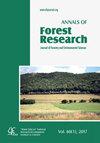山核桃质体基因组的结构、进化和系统基因组特征。帝国
IF 1.7
3区 农林科学
Q2 FORESTRY
引用次数: 4
摘要
世界上经济上最重要的坚果树种属于胡桃科,丛林科。对该部落物种的进化研究对于理解驱动这些物种进化和系统学的分子基础非常重要。在本研究中,我们发布了伊利诺伊C.illinoinensis cv的完整质体基因组。帝国的使用IonTorrent NGS平台,我们生成了8.5´108 bp的原始序列,使该物种的完整质体基因组得以组装。质体基因组长160818bp,具有四方结构,LSC为90041bp,SSC为18791bp,两个IR为25993bp。共预测了78个蛋白质编码区、37个tRNA编码区和8个rRNA编码区。在栽培品种Imperial中检测到同义密码子使用的偏差,三个tRNA编码区被确定为核苷酸差异的热点,dN/dS比率的估计值很高。在非编码区中发现的SSR位点的高比例可能提供信息性遗传标记,有助于广泛的遗传研究。尽管质体基因组之间存在显著的结构差异,但物种之间的系统发育关系得到了整个质体基因组分析的支持,支持了胡桃科中胡桃亚科和胡桃亚科的单系性。本文章由计算机程序翻译,如有差异,请以英文原文为准。
Structural, evolutionary and phylogenomic features of the plastid genome of Carya illinoinensis cv. Imperial
The economically most important nut tree species in the world belong to family Juglandaceae, tribe Jungladeae. Evolutive investigations concerning species from this tribe are important for understanding the molecular basis driving the evolution and systematics of these species. In this study, we release the complete plastid genome of C. illinoinensis cv. Imperial. Using an IonTorrent NGS platform we generated 8.5 ´ 10 8 bp of raw sequences, enabling the assemblage of the complete plastid genome of this species. The plastid genome is 160,818 bp long, having a quadripartite structure with an LSC of 90,041 bp, an SSC of 18,791 bp and two IRs of 25,993 bp. A total of 78 protein-coding, 37 tRNA-coding, and 8 rRNA-coding regions were predicted. Bias in synonymous codon usage was detected in cultivar Imperial and three tRNA-coding regions were identified as hotspots of nucleotide divergence, with high estimations of dN/dS ratio. The high fraction of SSR loci prospected in non-coding regions may provide informative genetic markers, useful to a wide range of genetic researches. Despite the significant structural differences among plastid genomes, the phylogenetic relationships among species is supported by the whole plastid genome analysis, supporting the monophyly of subtribes Caryinae and Juglandinae within family Juglandaceae.
求助全文
通过发布文献求助,成功后即可免费获取论文全文。
去求助
来源期刊

Annals of Forest Research
FORESTRY-
CiteScore
2.20
自引率
11.10%
发文量
11
审稿时长
12 weeks
期刊介绍:
Annals of Forest Research is a semestrial open access journal, which publishes research articles, research notes and critical review papers, exclusively in English, on topics dealing with forestry and environmental sciences. The journal promotes high scientific level articles, by following international editorial conventions and by applying a peer-review selection process.
 求助内容:
求助内容: 应助结果提醒方式:
应助结果提醒方式:


